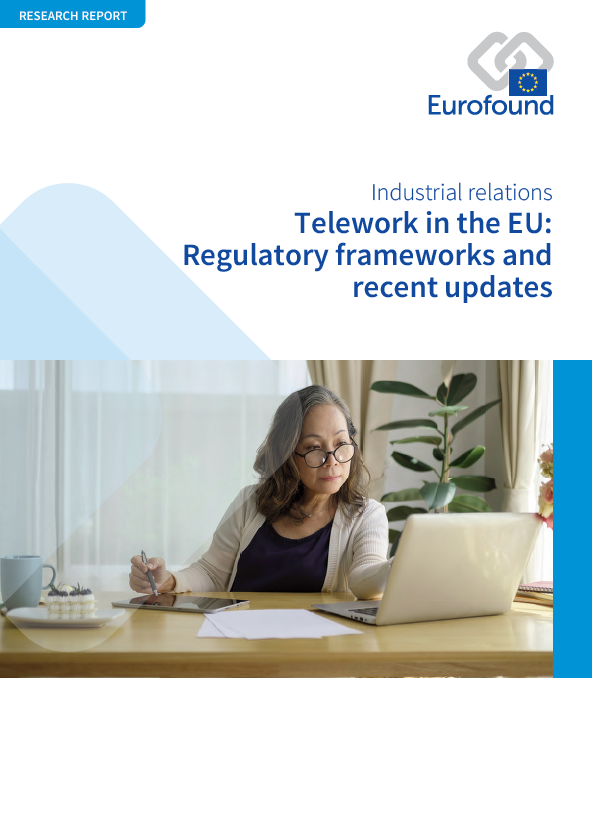
This report sets out to map and analyse legislation and collective bargaining on telework in the 27 Member States and Norway. It highlights the main cross-country differences and similarities regarding telework legislation and recent changes to these regulations. It also examines the current situation regarding collective bargaining on telework. The analysis highlights many of the drawbacks and challenges of telework, focusing on provisions relating to access to telework, flexible working time, continuous availability/connectivity, isolation, occupational and health risk prevention and the costs incurred by the employee while working remotely. With COVID-19 having been an accelerator for regulating telework both in legislation and through collective bargaining, the report sheds light on how the future of telework could be regulated at national and EU level to improve working conditions and the well-being of workers.
Key findings
- Telework is here to stay. Monitoring developments in Member States must remain a priority for policymakers, particularly on issues such as different types of telework arrangements, the organisation of working time, the right to disconnect, the right to request telework, the relationship between telework and gender equality, work–life balance and psychosocial risks. If teleworkers across the EU are to be protected equally, shared standards will also be necessary.
- There is no one size fits all approach to regulating telework as remote working requires different combinations of regulation, policies and work culture. Social dialogue can play a critical role in implementing telework regulations to protect employees and create positive outcomes for both employers and workers.
- Ten countries adopted new regulation on telework since the beginning of the pandemic, underlining the importance of further developing capacity building for social dialogue. In Member States with a relatively weak culture of social dialogue, implementing national-level regulation at company level and protecting employees teleworking is especially challenging.
- A significant number of collective agreements on telework were introduced during the pandemic at company and sectoral levels, particularly in sectors with existing arrangements, such as in financial services, manufacturing and information and communications. New agreements were developed in the public services and administration, education, and health and social work activities sectors, highlighting how telework is fast becoming an established way of work organisation across the EU.
- The number of countries that have included the right to telework in national legislation has doubled since the beginning of the pandemic. Employees with teleworkable jobs in several countries are now entitled to request telework, including in France, Lithuania, Portugal and the Netherlands, with legislation being developed in Germany and Ireland.
The report contains the following lists of tables and figures.
List of tables
- Table 1: Key terms and definitions
- Table 2: Telework regulation clusters
- Table 3: Changes in national regulations of telework
- Table 4: Main topics addressed in telework legislative reforms
- Table 5: Overview of national-level (cross-industry) collective agreements on telework
- Table 6: Statutory definitions of telework
- Table 7: Legislative provisions on the right to disconnect
- Table 8: Overview of sectoral collective agreements by sector and country
- Table 9: Sample of company-level collective agreements by countries and date of entry
List of figures
- Figure 1: Regulation of telework in EU countries and Norway
- Figure 2: Number of sectors covered by sectoral agreements with telework provisions by selected Member States, 2021
- Figure 3: Number of selected Member States with collective agreements on telework by sector, 2021
- Figure 4: Number of sectoral-level agreements with telework provisions covering different aspects
- Number of pages
-
80
- Reference nº
-
EF22032
- ISBN
-
ISBN 978-92-897-2272-8
- Catalogue nº
-
TJ-07-22-792-EN-N
- DOI
-
doi:10.2806/42974
- Permalink
Cite this publication
Eurofound (2022), Telework in the EU: Regulatory frameworks and recent updates, Publications Office of the European Union, Luxembourg.